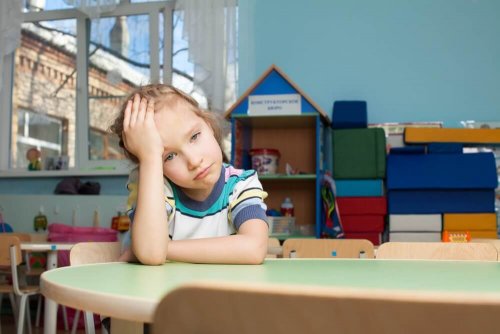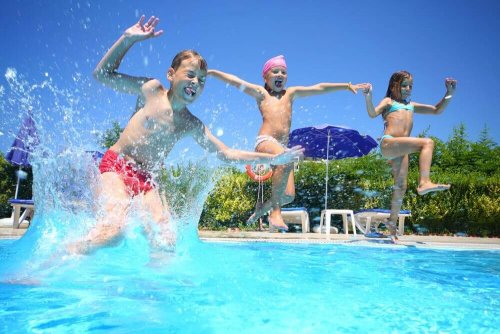The Children Who Are Overloaded with Activities

In this time and age, a lot of children are overloaded with extracurricular activities. While most of their helicopter parents mean well and are convinced they’re doing the best for their children, they don’t realize the damage they’re doing to their offspring.
Typically, an overload of activities doesn’t even match the interests and preferences of the child. Rather, it has to do with the inability of parents to spend some of their free time with their children after the school day is over.
In other cases, it’s also about the obsessive desire that some parents have for their children to “be competitive” and “have the best opportunities.” While this is a great wish, what such authoritarian parents don’t realize is that they’re adding a lot of stress and pressure to their little ones.
Further, they’re taking away children’s right to play freely. By overloading them with extracurricular activities, they practically rob them of their childhood freedom. It may sound harsh, but it’s the way of the world and it needs to be said.
A Schedule Overloaded with Activities

Over-saturation of children begins with extracurricular activities. Children attend regular school, do homework and then have to comply with a busy schedule that also includes sports practices, learning instruments, languages, art, and computer activities, just to name a few.
What’s worse is that – most of the time – children aren’t even interested in such pursuits, but parents just don’t listen to them. In some sad cases, the children may not even know what they truly want because they’re so used to their parents forcing them to do things.
Most parents want their children to be the best they can be and to give them a head start in life and in the competitive job market. Unfortunately, however, “the road to hell is paved with good intentions,” as they say.
This overload of activities extends to the weekends in many cases, and there is just no free time to play what they want to play with other children (of their choosing). Generally, they have to attend presentations and competitions on those days because they’re part of extracurricular activities.
Then, their holiday time is also saturated. During this time, many children attend all sorts of summer camps, which are known for their extensive program of activities. Then, they also participate in cultural events and presentations dedicated to children.
Children often enjoy a lot of what they do, but the rigid organization of their activities leaves them little room to interact spontaneously with other children. It then makes it harder to be spontaneous and to play freely.
You may be interested: My Child Can’t Stop Playing Video Games
Without Free Play, There’s No Childhood

We’re not trying to discredit extracurricular activities here. The thing is, however, that children don’t have time for everything.
Meanwhile, free and spontaneous games with other children are vital for their development. However, the desire that parents have to fill children’s free time often leaves these with less and less room to play.
Here, we’re talking about the spontaneous play that doesn’t have a didactic, competitive or specific pedagogical purpose. This is where they – not adults – define the rules. This isn’t just fundamental for the healthy growth of children. It’s the perfect formula to socialize, learn to manage emotions, stimulate creativity, improve self-esteem, and de-stress.
Children need to play for the game itself, not for particular learning purposes. This learning comes by default as children are constantly learning.
However, the time that a child spends playing freely with other children is becoming less frequent – especially in urban areas. This includes neighborhoods with no recreational spaces or places where children are trapped inside their homes while both parents work.
Children face something today that their parents or grandparents most likely didn’t have to, and it’s what’s affecting the development of their social skills. Young children need to play with older children because it promotes their brain development. Also, all of them need to play outdoors to create and share without the imposing direction of adults.
Read more: 6 Characteristics of Absent Parents
Overloaded with Activities: Take the Load Off
Parents try to fill their children’s days because, most likely, they have no other choice or want to do so “for their child’s good.” However, it’s still possible to keep children busy without saturating their schedule.
Here are some tips to do so:
- Keep in mind the interests and temperament of the child. If you must fill their free time, then do so with activities that they like and with which they can easily integrate. Skip any activities that reinforce school content because that’s what school is for.
- Don’t overload their agenda. Children need plenty of time to do homework, relax, spend time with their family and opportunities to talk. They also need opportunities to get bored. The child should be free of extracurricular activities at least two days per week.
- If they don’t like an activity, then don’t force them to do it. There has to be a balance between encouraging them to stick to something and knowing when you should back off. Before committing them to attend a certain activity, let them try it for a couple of sessions. A child should enjoy spending their time in it.
- Don’t become a source of stress for your child. If they show symptoms of tiredness, insomnia or overall distress, then perhaps they can’t do it anymore. You have to give them the space they need to just chill and do nothing if they so choose.
- Organize play dates. Help your children find opportunities to meet other children just for playing purposes. You don’t need a lot of planning, it’s just about fostering time with other children so that they freely decide how and what to do.
Playing is as Important as Breathing and Eating

Spontaneous games are as important for children as breathing and eating. They’re the key that opens the doors to their relationship with the world around them.
The organization of extracurricular activities mainly aligns with the interests and needs of parents. Instead, it has to be about the child. Their schedule must leave room for them to just play for the pleasure of playing.
Children overloaded with activities aren’t happy and thriving. Stop torturing yours with your high expectations for their success.
All cited sources were thoroughly reviewed by our team to ensure their quality, reliability, currency, and validity. The bibliography of this article was considered reliable and of academic or scientific accuracy.
- Acuña, Marciano, and María José Rodrigo. “La organización de las actividades cotidianas de los niños. Un análisis del currículum educativo familiar.” Cultura y educación 8.4 (1996): 19-30.
- Feldman, Jean R. Autoestima para niños: juegos, actividades, recursos, experiencias creativas. Alfaomega, 2002.
- Fernández, Isabel Castillo, and Isabel Balaguer Sola. “Patrones de actividades físicas en niños y adolescentes.” Apunts. Educación física y deportes 4.54 (1998): 22-29.
This text is provided for informational purposes only and does not replace consultation with a professional. If in doubt, consult your specialist.








